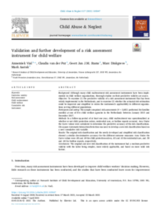Abstract
Background
Although many child maltreatment risk assessment instruments have been implemented in child welfare organizations, thorough studies on their predictive validity are scarce.
Objective
To examine (1) the predictive validity of a risk assessment instrument that has been widely implemented in the Netherlands, and to examine (2) whether the actuarial risk estimation could be improved and simplified to widen the instrument’s applicability to different organizations serving different populations.
Participants and setting
The sample comprised risk assessments (N = 3,681) performed for families enrolled at one of five child welfare agencies in the Netherlands between January 2015 and December 2017.
Methods
In a follow-up period of at least one year, child maltreatment was operationalized as whether or not child protection orders, residential care, or hotline reports occurred. Area Under the Curve values were calculated to determine the predictive accuracy of the risk classifications. Chi-square Automatic Interaction Detection was used to develop a new risk classification based on a new cumulative risk variable.
Results
The original risk classification and the newly developed and simplified risk classification showed a similar discriminative accuracy for the different outcome measures: Area Under the Curve values were .68 and .69 for child protection orders, .62 and .63 for residential care, and .58 and .60 for hotline reports, respectively.
Conclusions
The original and new risk classification of the instrument had a medium predictive validity with the latter being simpler, more widely applicable, and based on more valid risk factors.

